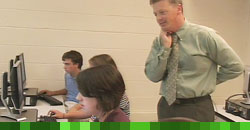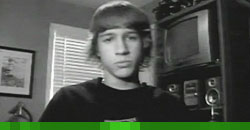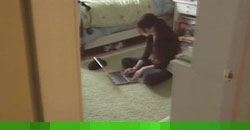


Dear FRONTLINE,
Well I've watched the program and as a 20 year old I'd like to say that it all comes down to moderation. Parents should teach their kids to be open to talking with the family when they are young and then as they grow they will have to allow for kids and teens to have their "secrets," but at the same time they will also tend to be more open. I tend to hide things from my family due to how I think that they will react and because I also believe it to be my life. I don't mind a healthy inquisition but not an overbearing and overly controlling interest. Another thing that rings true to me is when I had in the past gone to high school parties my mom herself said to me about how she was once young and she knows what goes on at those things. That is more how I think that the subjects should be approached when parents see pictures of drinking and such online. They were young and they did much the same things that we do. If they had had the technology they would have done what we also do now with myspace and the other similar sites.
Cicero, IL
Dear FRONTLINE,
Why are these parents wringing their hands? If their children won't tell their parents their passwords, the parents should remove the computers (that they paid for), get rid of the cell phones (that they paid for) and stop paying for cell phone service and internet access. I found it amusing that several of the children stated that they don't think it's any of their parents' business, but they're percfectly alright with their parents footing the bills. Having computers and cell phones are a privelege - not a right. Like it or not, as long as their parents are paying the bills (internet access, cell phones, college tuition), the parents get to call the shots. When the child has become mature enough to pay for all these services themselves, they have gained the right to do as they wish. As much as I found the children's sense of entitlement to be annoying, I felt the parent (Evan Skinner?) went far above and beyond when it came to smothering her children. She should not have sent the concert pics to the entire PTA, but if her son didn't like it, he should have looked into getting a job so he could pay for his own computer, service, and phone.
San Antonio, Texas
Dear FRONTLINE,
Having just watched the program, I was left astounded a bit that so many parents today haven't a clue to the ramifications of the internet and its effects upon their children. While the concentration or focus of the show illustrated some very serious issues, I feel a more basic core value was missed.
Honesty was alluded to. The cover-ups, the hiding, the lies are all symptomatic of a deeper issue. The 'freedom' of the internet includes for the younger generation the means to take what they will. Music, video, software, pictures are all available for free with a minimum of effort to circumvent the legal means to obtain them.
So what bearing does this have on what the broadcast showed? Consider growing up with the belief that anything of value is one's for the taking. That no payment is required for any form of entertainment. That what one wants can be had now without any major effort being expended. That there will be no repercussions for illegal actions.
Further think over what this will mean as the child becomes an adult and begins to take their place in economic society. When theft is a 'given'. When it is a social plus. Theft of the truth as a problem will be eclipsed by the reality of theft of product. When the basic moral value becomes "because I can" rather than any consideration of "whether I should".
This and many more core changes to our children I feel will be more broad-reaching in terms of the future of our society than any individual loss or personal crisis as seen on the show. This issue will supersede all those particular incidences shown.
While I feel terrible for the loss of children by their families both by the loss of life and of family unity - and I do indeed find those stories moving and sincerely horrible to see and hear of - the greater changes being wrought that will affect the entire future business and social community will be much more severe.
Renard Gervais
Bradenton, Florida
Dear FRONTLINE,
Growing up in the 70s, my parents considered it their job to know my friends so they could better understand where I was or what I might be doing. The Internet complicates that 'job' for parents of this online generation. However, I believe it is still our job to know "who,what,where,when&how" - as parents.
The mother in New Jersey - that was then ostracized was only doing what parents have done for generations - keep an eye on her children. If a parent isn't going to keep their eyes out for their child's safety, who is?
I believe too many parents today are fearful of parenting. We cannot always be perceived as our child's friend - we wouldn't then been setting the right boundaries and rules for our children. Our children need us to be their parent.
If I walk in the room and my teens turn off the computer or switch screens - the computer is mine. I check out the computer history, cache and files - and have 'grounded' a child or two from the use of the computer. It's my job to keep them safe.
I am not as savvy on the computer as they are - after all they have grown up in the cyber age - I try to keep up to date and appreciated tonight's special for helping me achieve a little bit more of that goal.
saugatuck, michigan
Dear FRONTLINE,
Good information! If you think the Chatham mother was out of line, then would you also believe that Ryan's father was out line??? Perhaps she could have contacted the school rather than take on the role of informant herself. It might have preserved her relationship with her son.
Ryan's family is among many suffering from "bullycide" - so terribly unfortunate.
The Internet is a great tool for knowledge and information, and I wish this program could address ways for adults to catch up with youth in our understanding of its potential. Teach children to talk to adults when they stumble on an inapproriate site, and to turn off the monitor and go for help when necessary. Parents can help by remembering not to overreact, but rather respond in a formative (not punitive) way.
L Lang
St. Louis, MO
Dear FRONTLINE,
How disappointing. I got so excited by the previews of this show that I told friends to tune in, but really you could call this "Parents reacting to their children's online activity." The truly interesting culture that is developing here is shadowed by a bunch of shock-consequence detours.
No, they are not fully-formed adults. But teenagers hate having their intelligence insulted. And this report does precisely that. The behaviors these teens are now developing will define the next decade of commerce and culture. And you did not give this generation a voice.
Guess I'll have to find it online.
Rebecca B
Chicago, IL
Dear FRONTLINE,
My 20 year old son and I just watched your program, and I was stunned that you chose Chatham High School students as examples of teens online. I saw a public school in a metropolitan area with no people of color, as students or faculty. Could you not have found a less diverse high school in the U.S.? The experiences of rich white kids in half million dollar homes with stay at home moms hardly represents the online life of most teenagers. The ones I know have part time jobs to go to, or parents who will cut them off the internet. I feel PBS searched an entire culture and came up with one wealthy, white corner to examine.
D Wells
Palm, FL
Dear FRONTLINE,
Thanks for keeping the attention of my teenage daughters! It helped them understand my paranoia; "Mom - that's what you do!" Also, I've gained insight on how teens are using the internet. With the many examples given our family now has a common understanding that will help us discuss the hot issues without getting hot-headed. (Perhaps. I can only hope!)
Robin P
St., Missouri
Dear FRONTLINE,
Great show!! My 31 year-old son has an 11 year old daughter. We've discussed what he's doing to monitor my granddaughter's Internet activity. She's allowed access only with parental supervision. There is software monitoring her web surfing which he checks regularly as to where she's been. He also has parental software control that only allows specific kid-friendly sites. I feel safer that he has been so pro-active to protect my granddaughter. I only hope that as she gets older this won't be a problem, but I'm confident that when she's in her teens, that growing up with this control, she'll be less resistant to rebel. The only concern I have is the fact a teen can bypass the home computer and got to hot spots in cybercafes or elsewhere.
Timothy M. Salay
Cleveland, Ohio
Dear FRONTLINE,
I am an avid Frontline viewer and believe it to be the best news program on television. However, I found tonight's broadcast incredibly disappointing and shallow. First of all, the interviews focused only on white parents and white teenagers. Second, the only non-white kids interviewed were those involved in a fight and rather shallow interviews at that. The only adults interviewed who had a clue about how to deal with this were Jess/Autumn's parents, who understood the benefit of the internet as a creative tool and the value of supporting their daughter's creativity and identity.
Lastly, the representation of teachers was incredibly disappointing. Again, you presented only white teachers, and those of an older generation who do little to demonstrate current best practices and incorporate media into their classrooms. Most schools, such as those in Chicago where I teach, cannot afford SMARTBOARDS, for goodness' sake, yet we find a way to constantly incorporate viewing images as well as text, integrating the arts, and using media with kids. If only you had bothered to explore outside the immediate circle of the producers.
Less "Dawson's Creek" next time, please, Frontline. We expect much more from you.
Meg A
Chicago, IL
Dear FRONTLINE,
I really appreciated this program, I'm 16 years old and am a veteran of sorts of the internet in general. I have seen many of the positive and negative effects of the internet. Through my time social networking I learned how to develop and design Web sites, how to design graphic art and have really found my identity and passion in life through the Internet. I have seen some less positive things as well, much cyberbullying while on the web as well as many disturbing photos. There are endless positive and negative consequences that can come from the world wide web. It just really depends on how you use it. Ashley Qualls a 17 year old has made over $1,000,000 off of her website while there are other people like Megan Meier who are subjugated to cruel cyberbullying.
Eric Private
Private, New Jersey
Dear FRONTLINE,
Thank you for a very interesting show. What I took away from this program was that we need to talk to our children EARLY ON -- from the age of 5 and 6 -- that what they put in writing is for the entire world to see. Period.
If a parent forbids their child to have a Facebook or MySpace account at home, the child will do it elsewhere. That is not the important thing here. What is important is that you teach them practical values that you begin instilling early on, that will last them their entire life.
J C
Redding, CT
Dear FRONTLINE,
Your episode on Growing Up Online was very balanced. While a lot of adults use the internet for information and social networking, I believe that the majority of them are savvy enough to know the dangers of connecting and exposing themselves to "virtual strangers". Children under the age of 18 should not mind their parents viewing their Facebook or MySpace pages. I do not believe however that parents should monitor the conversations the kids have with each other without being aware of the loss of trust issue and should only be done when they think there is actual danger involved to themselves or their friends. Every parent should know as many of their child's friends as possible. They should be aware of all the signs of depression and suicidal intent. Children under 18 can still be so niave as to trust a "virtual stranger" when they would never trust an actual stranger on the street. The internet can be a wonderful tool if used correctly. I hope that the majority of kids use it wisely.
bronx, new york
Dear FRONTLINE,
I can't believe the absolute naivete of those interviewed. Whoever thought that children were anything but little savages needing to be tamed is absolutely an idiot. Teenagers are among the nastiest groups around. The hormones that are raging in their bodies makes it impossible for them to make rational, well-thought out decisions, and if parents don't realize that they are lacking in basic parenting skills. The one thing that I saw around all of this was that the internet is nothing more than a new thing to blame for the same old, age-old problems that have always surrounded growing up.
Really? Who really believes that there is anything all that new here? Nothing was ever truly private, and nothing ever really will be. As to the parents who don't know how to control their children's internet access/use, there are plenty of tools around that will allow that without the child ever knowing. (And there are plenty of experts out there willing to help you spy on your kids internet. The same tools used by corporations, btw.)
Waterford, MI
Dear FRONTLINE,
Over the last few years I have had a lot of interaction both with teens and their parents. What I find most striking about the online generation is how almost boring they are compared to how things were when I was a teen (80's). An exciting night now seems to consist of talking with friends online, gardly what I would deem an exciting night. And the statistics tell the story even better. Teen pregnancy is down by a third since 1990. Similar trends can be found in practically all areas of risky or self-destructive behaviors; suicide itself is however trending up. The Frontline show did not attempt to tie the these trends into the rise of the Internet, and I would be interested to know what experts have to say about these relationships.
As far as the PTA mom goes, an overbearing busy-body is just that regardless of what era we speak. People such as this certainly serve a "stay within the lines" purpose, but you can't help but feel a little for the kids of the busy-bodies, and I also wonder how many of those kids go off the deep end once they get out of the house.
Owings Mills, MD